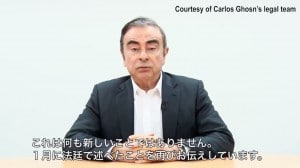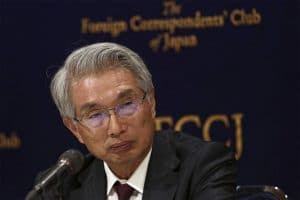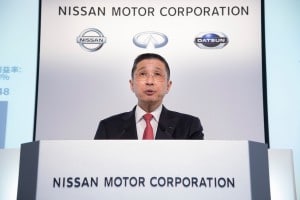
Former Nissan Chairman Carlos Ghosn clearly showed the impact of his detention when he issued a video statement last April proclaiming his innocence.
Carlos Ghosn has never been one to relax. As the long-time head of the Renault-Nissan-Mitsubishi Alliance, he spent much of his time winging around the world overseeing one of the auto industry’s largest empires. Today, despite being limited in his movements, he remains busy, spending much of his time at the office of his lead attorney in Tokyo.
That’s where the 66-year-old executive is preparing for trial sometime next year on a variety of counts alleging corporate corruption, charges that could see Ghosn locked up for years in a Japanese prison. But the Brazilian-born executive hopes to beat the odds in a country where authorities almost always win at trial. Ghosn’s legal strategy is to turn things upside-down, laying out claims of a conspiracy between Nissan, the Japanese ministry of trade and prosecutors.
“Prosecutors have repeatedly and systematically denied Mr. Ghosn fundamental rights of due process and turned the presumption of innocence on its head,” Junichiro Hironaka, Ghosn’s lead attorney said in a statement issued last week, a year after the executive was unexpectedly arrested soon after his corporate jet arrived at Tokyo’s Haneda Airport.
Shortly after the handcuffed Ghosn was yanked off the plane and taken to the Tokyo Detention Center, authorities accused him of failing to report millions of dollars in income. In the months that followed, they laid out an array of additional charges, routinely waiting until Ghosn was set to be released from detention to describe each of the new allegations. That strategy ultimately resulted in the one-time corporate superstar being kept in a tiny cell, with a mat on the floor serving as his bed, for 130 days.
(SEC fines Ghosn and Nissan for false reporting of compensation.)

Known as “the Razor,” Ghosn’s lead attorney, Junichiro Hironaka, has been pushing to turn the case upside-down, focusing on an alleged conspiracy by government officials and Nissan.
Almost as soon as Ghosn was locked up, Nissan moved to remove him from his corporate post — a step followed soon afterwards by Mitsubishi and, eventually, Renault. Hirota Saikawa, the CEO of Japan’s second-largest automaker, quickly spoke out about his one-time mentor, harshly criticizing Ghosn and revealing that the case was triggered by an internal corporate probe.
Ironically, Saikawa himself would be caught up in that net himself, in an embarrassing twist acknowledging in September that he also was overpaid to the tune of tens of millions of yen. Saikawa subsequently announced plans to retire, Nissan set to formally install a new CEO at the beginning of the year.
If anything, the revelation about Saikawa has only encouraged Ghosn to escalate his fight against his own corruption charges.
(Nissan CEO admits to getting overpaid, benefitted from program that Led to Ghosn’s ouster)
One of the key questions centers around how much evidence prosecutors actually have – and where it comes from. The legal team led by Hironaka – one of Japan’s most famous and successful defense attorneys – has argued that the case is really based on a conspiracy to push Ghosn out of his management role.
They aren’t alone, as TheDetroitBureau.com has reported over the past year. There have been numerous questions raised about Japan’s acceptance of foreigners in high-level positions. As Nissan expanded its probe following Ghosn’s arrest, many sources raised concerns about what one described as a “blood-letting,” one largely aimed at non-Japanese employees. Among those forced out was Nissan Chief Performance Officer Jose Munoz.

Nissan CEO Hiroto Saikawa was harshly critical of Ghosn, following the exec’s arrest. But Saikawa was later found to have received excess pay himself.
Hironaka has contended that, to make their case, prosecutors worked with Nissan “to drum up allegations of wrongdoing” against Ghosn, noted a report by Bloomberg.
A recent report by the news service quoted Nobuo Gohara, a former Japanese prosecutor, who has become critical of the case against Ghosn. “It’s abnormal, this whole process,” said Gohara, who is not involved in the defense process. “They probably arrested Ghosn for the sake of arresting him. There’s no way they can build a case with just Nissan’s support.”
The case has generated plenty of scrutiny and a fair share of criticism. French authorities initially raised concerns about the legal process, especially the extended detention of Ghosn – though they eventually pressured Renault to terminate the executive’s employment.
Ghosn’s wife, who has largely been barred from meeting with him, urged global human rights organizations to weigh in on the case.
But the executive has taken plenty of hits of his own. It didn’t help that a number of questions were raised about Ghosn’s use of corporate funds to help pay for his wedding at Versailles. And, over the months, new allegations have surfaced, including claims that Nissan money was diverted to a Middle East ally of the former executive who, in turn, used that to back an investment fund operated by Ghosn and his son in Silicon Valley.
For their part, Ghosn and his attorneys insist the drip-drip-drip of new allegations has been carefully choreographed by his Nissan and government foes in a bid to make it harder for him to get a fair trial.
When he will face charges in court is uncertain, the case now expected to push sometime into the first half of 2020.
For now, Hironaka and his client deal with pre-trial hearings roughly once a month in the 17th Criminal Court Division of the Tokyo District Court. They have been pushing to get some of the charges dropped and limit the evidence that can be presented on other allegations. In the meantime, they also have been trying to keep the case in the public eye – but on their own terms, escalating efforts to position it as a conspiracy to frame an innocent man, rather than one of greed and corporate corruption.
(Nissan brings all-new Sentra to LA Auto Show. Click Here for a closer look.)

Ghosn is a crook. He swindled many Nissan owners by selling them problem prone junk hidden behind nissans past reputation of reliability. He single handedly ruined Nissan since day one. It just took several years for the public to realize just how shoddy Nissan products became since him and Renault. He is the reason many will never buy another Nissan again.